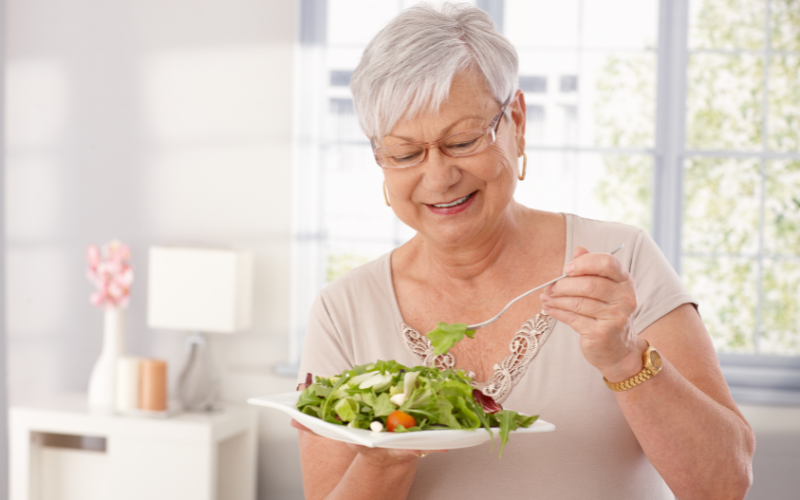
Obesity is a significant concern for many individuals, but it poses an even greater risk for elderly people. Seniors are already vulnerable to age-related health issues, and obesity can exacerbate these risks. In fact, studies have shown that obesity can lead to a myriad of health problems for seniors, such as heart disease, stroke, diabetes, and even certain types of cancer. While many factors contribute to obesity in older adults, there are steps they can take to manage their weight and improve their overall health.
Many people understand the dangers of obesity, but it’s often challenging for those living with it to fully grasp the issue. As a result, seeking assistance for obese senior parents or elderly loved ones can be daunting. Obesity is a complex issue that requires careful management and support. As we age, our bodies change, and it becomes more difficult to maintain a healthy weight. This can be especially true for seniors, as their metabolism slows down and they may have mobility limitations or health conditions that make exercise challenging.
If you need assistance getting help for your senior parent, then continue reading for some tips on how to care for elderly parents affected by obesity.
1. Focus on the Person’s Health and Not Their Size
In any situation regarding someone’s weight, you should place all focus on the individual’s health and not on how big or heavy they are. This is important because you do not want to reinforce any negative body ideas that can encourage eating disorders and other negative habits.
While weight loss is important in improving an obese person’s health, the ultimate goal is improving their health, not losing as much weight as they can. A focus on health emphasizes the person’s well-being instead of their appearance, and health is the legitimate concern regarding obesity.
Take the time to speak with your parents to let them know you are concerned about their health. Help them understand that their obese condition means that they are more prone to suffering from health problems like heart disease, diabetes, and even cancer among other diseases.
Furthermore, let your parents know you love and value them. Tell them you want them around for as long as possible and how they need to be healthy for a longer life.
Many elderly parents enjoy spending time with their grandchildren. But if they do not take care of their health, the chance that they will be able to see their grandkids grow up is slim.
2. Determine the Root of their Obesity
Before taking steps to address the obesity of your senior parents, it is important to first identify the root cause. Pinpointing the cause behind the actions that have led to their obesity will help you take a more focused approach.
In many cases, it may be due to their diet and lifestyle. Evaluate the diet of your loved ones, including what types of foods they eat, their meal schedules, and portions. If they are not making healthy food choices, you can encourage them by suggesting healthier alternatives. If they are overeating, you can try to limit their portions or create a schedule that spreads their meals out. You should also evaluate their lifestyle and encourage them to be more physically active, which can help them lose weight while making less changes to their diet.
If your senior parents are overeating to cope with emotional issues such as anxiety or depression, then you should address these issues with the help of a professional counselor.
3. Hire a Physician and/or Counselor
If your parent does not already have a physician, then you should hire one for them. This can be particularly helpful because a doctor will evaluate their health and inform them of any health problems they have and/or are at risk for. Some people may not believe they have a problem but may feel different if they receive such information from a credible, licensed professional. The physician can also determine the best ways to treat health issues.
Something else to consider is hiring a counselor.
If your parent is obese, this may be an issue of food consumption. Sometimes the reason for unhealthy food consumption is an inability to cook and access healthy foods and meals. But sometimes, unhealthy food consumption has nothing to do with food itself.
Just as some people use alcohol to cope, some seniors might be using food and overeating as a coping mechanism for a bigger, overlying problem. In such a case, a counselor can help them figure out what the underlying issue is, which will help them address the overeating that has led to obesity. They can also help elderly individuals establish a healthy way to cope with mental health concerns.
4. Set a Good Example
While your parents are older than you, this does not mean you cannot have an influence on them.
If you are practicing unhealthy eating habits, then your parents might be following suit. Part of providing care for elderly parents is being a good example, so make sure you are eating well and practicing healthy eating habits.
When you are with your parents, make it a habit to eat healthy foods, focusing on better food choices such as fruits and vegetables instead of sugar and processed foods. They will see you eating well and may feel inclined to do the same. If you eat unhealthy foods while with your parents, it only makes it easier for them to eat poorly, too.
5.Encourage Movement
Along with making smart food choices, you can also set a good example by being active.
When you spend time with your parents, engage in some type of physical activity and encourage them to join you. You will want to consider your parents’ abilities, so engaging in highly rigorous activity is not the best idea. But a simple walk around the neighborhood or in a park is a great form of exercise.
6. Create a Plan and Monitor their Progress
Work with your senior parents to create a plan to address their obesity that includes everything discussed above, such as focusing on their physical and emotional health with the help of professionals, making diet changes, and encouraging exercise. When forming this plan, it is very important to include your senior loved ones, so they have a say.
Within the plan, set realistic goals, such as cutting out a type of food or walking a certain distance per week. You can also set weight loss goals to lose a certain amount of weight each month. Celebrate meeting each of these goals to help your loved ones feel good about the work they are putting in and encourage them to continue. Setting goals also helps you keep good track of their progress.
In-Home Care Services from Assisting Hands

At times, older adults may struggle with making healthy food choices due to challenges in self-care. They might feel uneasy about cooking or lack the mobility to shop for nutritious foods, leading them to rely on low-nutrient options like processed or microwave meals. Seniors may also find it challenging to maintain healthy eating habits without someone to help keep them on track. However, this issue can be addressed by arranging for in-home care for your elderly parent.
In-home care services typically include meal preparation, which means your loved one will have access to healthy and nutritious meals. This eliminates the need for them to shop for groceries or cook on their own. Moreover, in-home caregivers can also assist with grocery shopping by taking seniors to the store and helping them pick out healthy food options.
Assisting Hands Home Care offers in-home care services to seniors in Deerfield, IL | Lake Zurich, IL | Lake Forest, IL | Lincolnshire, IL | Vernon Hills, IL | Highland Park, IL | Libertyville, IL | Round Lake Beach, IL, and neighboring communities. A dedicated caregiver will be assigned to your loved one, providing assistance with everyday living at home. Our elderly home care services encompass bathing, grooming, meal preparation, and running errands for healthy groceries. Caregivers also accompany seniors on walks to promote an active lifestyle.
With help from our senior care services, you can feel at ease knowing someone is there to help your senior parents live a healthier lifestyle. Call us at (224) 268-9068.















